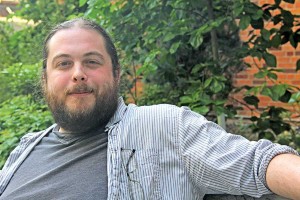 Humanities
Humanities
Big Daddies, Little Sisters
 The video game BioShock has all the trappings of today’s elaborate first-person shooter games: monstrous adversaries, breathtaking cityscapes and ample amounts of graphic violence.
The video game BioShock has all the trappings of today’s elaborate first-person shooter games: monstrous adversaries, breathtaking cityscapes and ample amounts of graphic violence.
But can a blood-and-guts video game be used to explore what it means to be a man—or a woman?
Jason Irrgang (left) was determined to find out, parlaying his personal history as a gamer into a rewarding academic pursuit.
There was a time when the idea of taking on a massive research project would have been fantasy. Irrgang, who graduated from the UO over the summer, was a self-described “terrible student” in high school, battling drug addiction; however, he found his footing in community college and after transferring to the UO, quickly pushed his GPA over 3.70 and won admission to the English honors program. To receive his degree with honors, Irrgang was required to write a fifty-page critical essay based on his own research and interpretation.
(Curious about what you can do with an English degree?)
It was a challenge he wholeheartedly embraced—combining his passion for gaming and his love of literature to demonstrate that video games are no less appropriate than Shakespeare or Beowulf as vehicles for literary criticism. In fact, his research subject—the post-apocalyptic game BioShock—incorporates ideas from popular authors Ayn Rand and George Orwell.
To explore the issue of gender, Irrgang focused on the game’s central characters: “Big Daddies,” the hulking, half-man, half-machine antagonists (right) that exist only to kill or work as laborers; and “Little Sisters,” diminutive female innocents with reproductive qualities essential to the survival of the underwater city of Rapture. In his paper, Irrgang concludes that the game is an excellent example of the controversial belief that sexual physiology—rather than culture—dictates male or female behavior.
Students in the English honors program can take two terms that are devoted completely to their thesis, thereby easing the regular academic load while concentrating on their research and receiving guidance from an adviser. That guidance was critical for Irrgang, who relied on associate professor of English Betsy Wheeler to help him fine-tune his project and soldier on during those periods when he felt overwhelmed.
“This is all on you—this is your idea and the university isn’t going to hold your hand,” he said. “I often was really anxious about this project and whether I could actually get this done. I needed someone who could talk me through it.”
His mentor, Wheeler, is an admirer. “His project shows the possibilities for undergraduates to do research that is innovative, theoretically sophisticated and very important—politically and socially,” she said. And the content of his project is important from a scholarly standpoint because “he is criticizing the construction of masculinity in gaming from the standpoint of a cultural insider—a man and a gamer.”
Now an advocate for the transformative power of education, Irrgang seeks to inspire others: He volunteers as a tutor with an agency that provides services to children affected by abuse, neglect, drug addiction and homelessness. He recalled spending months helping a student pass a state assessment exam and pursue his own dream of going to college.
“When I started tutoring him, it was like I was looking at me ten years ago,” Irrgang said. “It was very gratifying.”
The next stop is Detroit: Irrgang has joined Teach for America, a national corps of recent college graduates who commit two years to teaching and effecting change in underprivileged urban and rural public schools. Irrgang’s “thoughtful masculinity” will make him a great role model, Wheeler said.
—Matt Cooper
Photo of Irrgang: Matt Cooper


 Twitter
Twitter Facebook
Facebook Forward
Forward